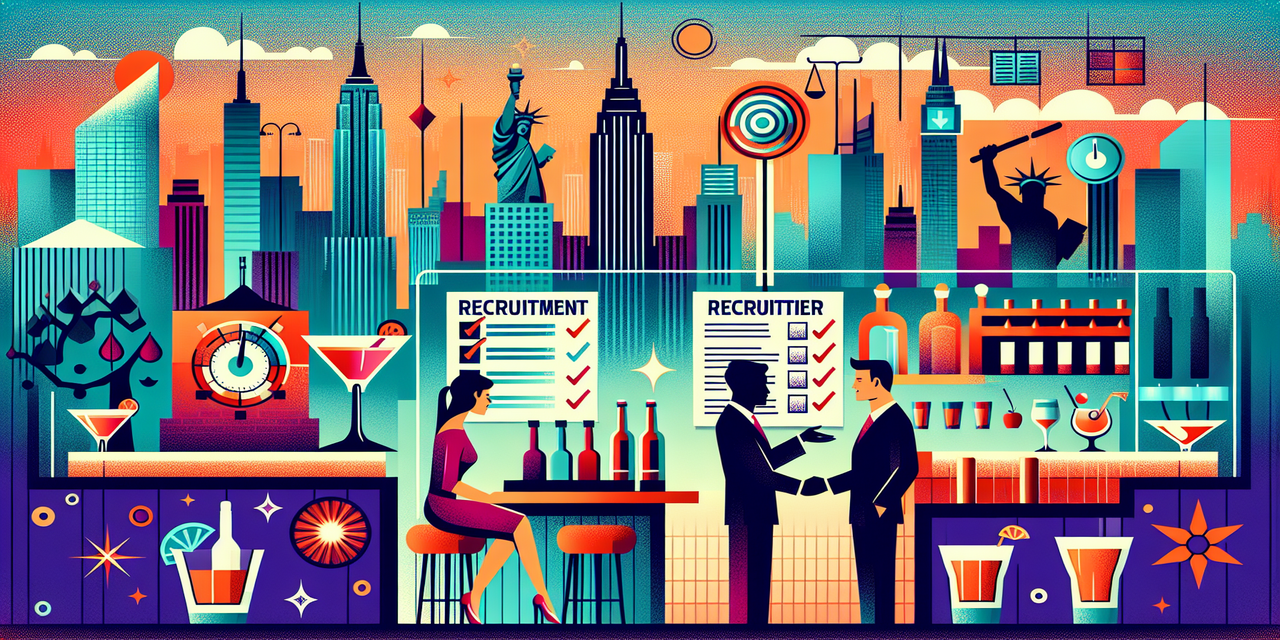How to Hire Bartender in New York City: Key Takeaways
- Bartenders must be at least 18 years old to serve alcohol legally in NYC.
- As of 2025, the minimum wage for bartenders is $16.50 per hour, with a tip credit allowing a cash wage as low as $11.00.
- Effective interviews include asking about mixology skills, handling difficult customers, and flexibility with peak-hour shifts.
Hiring a bartender in New York City involves knowing legal age restrictions, wage rules including tip credit, and conducting skill-focused interviews.
Employers looking to attract qualified bartenders can benefit from hiring strategies that appeal to bartenders.
Understanding these key points helps employers comply with laws and attract qualified bartenders.
1. Legal Requirements for Hiring Bartenders in New York City
New York City has specific legal standards for bartenders that employers must follow to stay compliant.
For employers, it’s useful to understand the age requirement details for bartenders to avoid any legal pitfalls.
Age Requirement
Bartenders must be at least 18 years old to legally serve alcoholic beverages in NYC. Hiring anyone under this age is not permitted and could result in penalties.
Certifications and Training
While no formal bartending license is required by NYC, many employers prefer candidates who have completed responsible beverage service programs such as the Alcohol Training Awareness Program (ATAP).
Such training helps ensure knowledge of laws regarding serving alcohol responsibly and managing intoxicated patrons.
Employers can find tips on how to guide certification and training for bartenders.
2. Wages and Tip Credit for Bartenders in NYC
Understanding wage rules is critical when hiring to ensure compliance with labor laws and fair compensation.
Minimum Wage
Effective January 1, 2025, the minimum wage for bartenders in New York City is set at $16.50 per hour.
Tip Credit Structure
Employers may apply a tip credit of up to $5.50 per hour. This means the employer can pay as low as $11.00 per hour in cash wages, provided that the employee’s combined cash wage plus tips equals or exceeds the $16.50 minimum wage.
Employers must carefully track tips to ensure total pay meets legal minimums.
Using digital and streamlined systems can help with tip tracking and management for bartenders.
Typical Earnings for Bartenders
Bartenders in NYC often earn significantly more than the base wage due to tips. Average base pay is about $18.78 per hour, and daily tips can amount to around $200, yielding total estimated earnings of $370 for a full 8-hour shift.
3. Interview Tips for Hiring Bartenders in New York City
Hiring the right bartender means assessing both skill and fit. Here are some effective interview strategies.
For interview preparations, this bartender interview questions guide can be very helpful.
Preparation and Knowledge
Candidates who research the establishment, including its drink menu, clientele, and ambiance, demonstrate genuine interest and alignment with the employer’s brand.
Flexibility and Availability
Since bars experience high volume during evenings, weekends, and holidays, highlighting your availability during these times is an important interview point.
Professionalism in Appearance and Attitude
Presenting yourself professionally by dressing appropriately, punctuality, and courteous interaction with staff will leave a positive impression.
Mixology Skills and Experience
Discuss your knowledge of cocktails, spirits, and serving techniques. Share examples of managing high-pressure situations or resolving conflicts with patrons.
Learn more about key mixologist interview questions to further evaluate cocktail crafting skills.
Role-Playing Scenarios
Many employers include hypothetical questions to evaluate problem-solving abilities. Examples include addressing intoxicated customers or mediating disputes between guests.
4. Best Practices and Additional Considerations When Hiring Bartenders in NYC
Employers should maintain updated knowledge of labor laws and wage standards to ensure ongoing compliance.
Maintaining clear documentation of wage payments and tip credits helps avoid disputes or legal issues.
Offering opportunities for certified training such as ATAP can improve employee preparedness and reduce liability issues.
Explore further insights about bartender health and safety best practices.
5. Useful Official Resources on Hiring Bartenders in New York City
- Refer to the New York State Department of Labor for wage laws and employment regulations.
- Consult the U.S. Department of Labor Wage and Hour Division for federal wage and tip credit guidelines.
- Explore the New York City Hospitality Alliance for industry-specific information and best practices.
How to Hire Bartender in New York City: Conclusion
Hiring a bartender in New York City requires understanding the minimum age and training expectations, complying with wage and tip credit regulations, and conducting thorough interviews focused on skills and professionalism.
Leveraging official resources and emphasizing flexibility and knowledge during interviews will help employers attract and retain quality bartenders who align with their venue’s needs and standards.
Additional guidance on successfully hiring bartenders can be found in this fast hiring guide for bartenders in NYC.


.png)

.png)
.jpg)